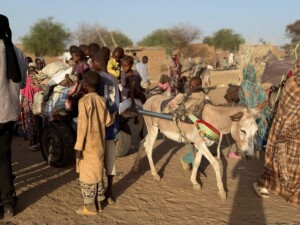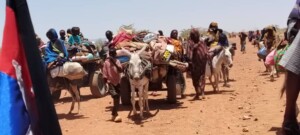MSF: Thousands of Ethiopian refugees live in ‘precarious conditions’ in Sudan
Thousands of refugees who fled conflict in northern Ethiopia’s Tigray region are stuck in precarious conditions in El Tenideba camp in neighbouring Sudan’s El Gedaref due to the rainy season, according to international humanitarian organisation Doctors Without Borders / Médecins Sans Frontières (MSF).
 Latrines in El Tanideba camp that were destroyed by the strong winds (MSF)
Latrines in El Tanideba camp that were destroyed by the strong winds (MSF)
Thousands of refugees who fled conflict in Ethiopia’s Tigray region are stuck in precarious conditions in El Tenideba camp in neighbouring El Gedaref in Sudan due to the rainy season, according to international humanitarian organisation Doctors Without Borders / Médecins Sans Frontières (MSF).
In May a storm created panic and destroyed 200 tents in El Tanideba, one of two official camps that together host over 40,000 refugees from Tigray in the region. Three weeks later on June 7, a second storm destroyed the remaining tents in the camp. Some refugees had managed to reinforce their tents in advance, but most lacked the material and funds to do so and are now sharing tents with others or in communal shelters.
The MSF clinic in the camp was also damaged by the second storm, despite measures taken to protect it. "The metal roof was damaged, the emergency room is not functional, the partitions fell down, and the biggest partition is broken," said Sergio Scor, MSF project coordinator. "The pharmacy was flooded, but thankfully the medication and the boxes of supplies were all safe on pallets and metal shelves. The damage to MSF's clinic can be repaired, but what was heartbreaking was hearing people screaming and seeing them running around the camp seeking shelter in the middle of the night."
"I was afraid for my life last night," said Rigat, a 25-year-old woman from Tigray. "I left my tent because it got destroyed and I ran with some belongings to my grandfather's tent, which he reinforced. When I arrived, there were 20 people inside. All the neighbors came to my grandfather's tent because it was still standing. But we could not sleep. There was no place to lie down. So we just sat there and waited for dawn. I really don't want to stay in this camp, but I know I can't go back to Tigray either. I don't know what to do."
Many refugees have expressed a wish to leave the camp due to the weather and deteriorating conditions. Each day dozens of people leave, some heading for Hamdayet, the crossing point between Sudan and Ethiopia, from which they return to the conflict area of Tigray. Others are going to the other camp in the state, Hashaba. However, most of the refugees who leave plan to head to Libya, from which they will risk their lives attempting to reach Europe.
Wind and flooding pose a dire threat
MSF had already raised the alarm at all levels, from camp management and aid agencies to governments and donors, about the risks of extreme weather conditions associated with the rainy season in this part of Sudan. The site selected for El Tanideba camp is built on "black cotton" soil, a clay soil, which is hard and cracks during dry season but becomes wet, sticky, and muddy in the rain. The area is prone to both high winds and flooding. There is an urgent need to carry out extreme wind and flood prevention activities and reinforce tents and latrines.
"These measures were supposed to be implemented several months ago, even before the arrival of refugees at the camp," said Jean-Nicolas Dangelser, MSF head of mission. "We all knew that the main issue of the camp is the extreme wind during [the] rainy season, and failure to prepare for it in a timely manner by aid organizations has left many refugees with no choice but to leave the camp. We will continue working to support people in the camp, but it is too late to repair the psychological pressure inflicted by the damage to their tents and possessions."
"I have four friends who went to Libya; the last call I had with them was two months ago," said a 24-year-old man named Ben who is living in El Tenideba. "They know the danger. I tried to tell them many times, but we cannot blame them. Look at this place. They go out of pure despair."
Source: Médecins Sans Frontières











 and then
and then